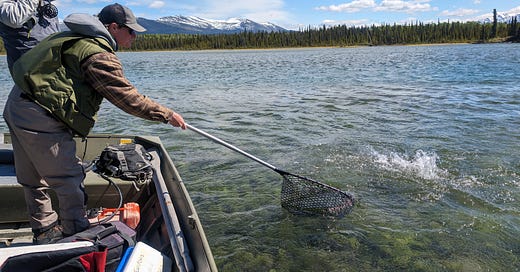Netting a Kathleen River rainbow trout
A quick taste of the boat ride on the Kathleen River.
Last month, while visiting the Yukon on a hosted trip with Hatch Adventure Travel, I learned something new about the Canadian territory’s rainbow trout. Initially, I was of the mind that rainbows that swim in the Yukon were the progeny of fish that were introduced in the 1950s for sport and food.
These non-natives still swim in the rivers and streams around Whitehorse, and the locals appreciate the angling diversity they provide (how does the saying go? “Man can’t live on pike alone?” Or maybe it’s “Let them eat grayling?”)
But, it turns out, the southern Yukon is home to a very rare and very unique strain of native rainbow trout that thrives in the Kathleen River system around Haines Junction. These fish are in the Yukon courtesy of the Tatshenshini and Alsek rivers, both of which flow into the Pacific after meandering courses around glacial ice fields and some of the most remote country on the continent. They meet the ocean around Glacier Bay.
And both rivers are home to rainbows. And, the Kathleen River is a tributary to the Alsek River, albeit a largely isolated one, thanks to Ice Age geology and such. And, I was told by fisheries experts in the Yukon, these fish have been genetically isolated for quite some time. This means that the rainbows found in the Kathleen River system are found nowhere else on earth. Pretty cool.
Close eye on Beryl
As I write this, Hurricane Beryl — the earliest-ever hurricane in the tropics to hit Category 5 (in July) — is raking the central Caribbean on its way to a collision course with the Yucatan coast.
Years ago, this wouldn’t have bothered me much. But these days, as a well-traveled fly fishing travel consultant and a managing partner in Hatch Adventure Travel, I keep a close eye on Caribbean storms. This one is putting several friends in peril — we have destination partners who operate fishing lodges in Punta Allen and Xcalak in Mexico and Ladyville in Belize — all three are in the path of this gnarly beast as it spins west. A fourth lodge on Roatan might catch a glancing blow.
Of course, there’s not much we can do, other than watch and hope for the best.
As I told my business partners in a group chat this morning, “It’s going to be a long summer.”
And all this as we continue to chip away at climate policy at the state and federal level. This behavior is criminal. Or at least it should be.





